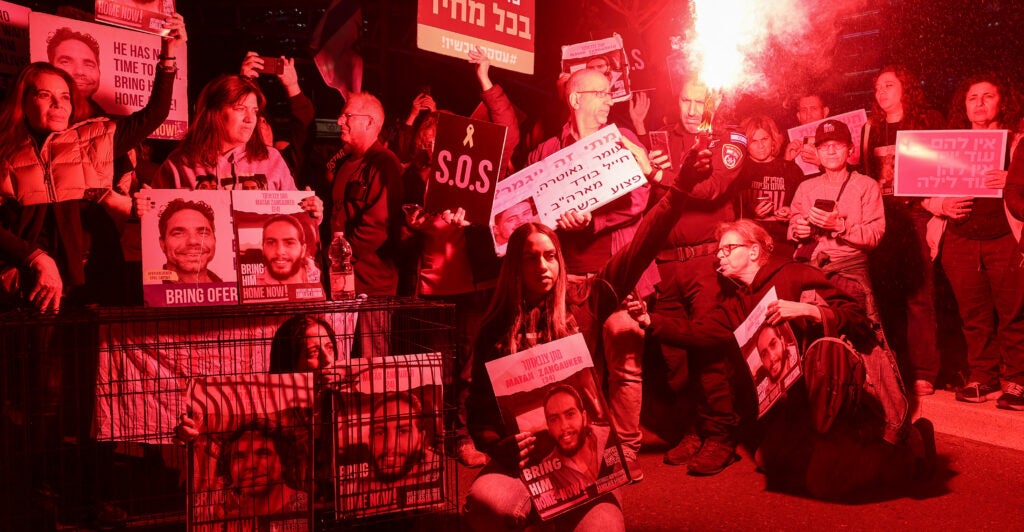‘Occupied Gaza’
Prior to Oct. 7, there were roughly 2 million Arab citizens of Israel but no Jewish citizens in the Gaza Strip. Gazans in 2006 voted in Hamas to rule them. It summarily executed its Palestinian Authority rivals.
Hamas canceled all future scheduled elections. It established a dictatorship and diverted hundreds of billions of dollars in international aid to build a vast underground labyrinth of military installations.
‘Collateral Damage’
Hamas began the Israel-Hamas war by deliberately targeting civilians. It massacred them on Oct. 7 when it invaded Israel during a time of peace and holidays. It sent more than 7,000 rockets into Israeli cities for the sole purpose of killing noncombatants.
Hamas has no vocabulary for the collateral damage of Israeli civilians, since it believes any Jewish death under any circumstances is cause for celebration.
Hamas places its terrorist centers beneath and inside hospitals, schools, and mosques. Why? Israel is assumed to have more reservations about collaterally hitting Gaza civilians than Hamas does about exposing them as human shields.
‘Disproportionate’
We are told that Israel wrongly uses disproportionate force to retaliate in Gaza. But it does so because no nation can win a war without disproportionate violence that hurts the enemy more than it is hurt by the enemy.
The U.S. incinerated German and Japanese cities with disproportionate force to end a war both Axis powers started. In Iraq, the American military nearly leveled Fallujah and Mosul by disproportional force to root out Islamic gunmen hiding among innocents.
Hamas has objections to disproportionate violence—but only when it is achieved by Israel and not Hamas.
‘Two-State Solution’
Prior to Oct. 7, there was a de facto three-state solution, given that Israel, the West Bank, and Gaza were all separate states ruled by their own governments, two of which were illegitimate without scheduled elections.
It was not Israel but the people of Gaza and the West Bank who institutionalized the “from river to the sea” agenda of destroying its neighbor.
Israel would have been content to live next to an autonomous Arab Gaza and West Bank that did not seek to destroy Israel in multigenerational efforts to form its own “one-state solution.”
‘Cease-Fire’
The so-called international community is demanding Israel agree to a “cease-fire.” But there was already a cease-fire prior to Oct. 7. Hamas broke it by massacring 1,200 Jews and taking over 250 hostages.
Hamas violated that peace because it thought it could gain leverage over Israel by murdering Jews.
Hamas now demands another cease-fire because it thinks it is no longer able to murder more unarmed Jews. Instead, it now fears that Israel will destroy Hamas in the way Hamas sought but failed to destroy Israel.
Did Hamas call for a cease-fire after the first 500 Jews it massacred on Oct. 7?
‘Ramadan’
President Joe Biden believes that the Muslim religious holiday of Ramadan requires Israel to agree to a cease-fire.
But did either Hamas or any other Arab military ever respect Jewish—or even its own—religious holidays?
The Oct. 7 massacre was timed to catch Israelis unaware while they celebrated the Jewish religious holidays of Simchat Torah, Shemini Torah, and Shemini Atzeret on Shabbat.
Moreover, Hamas’ surprise attack was deliberately timed to commemorate the earlier sneak Arab attack on Israel some 50 years earlier.
On Oct. 6, 1973, the Israelis were the target of a surprise attack when celebrating the religious holiday of Yom Kippur. Arab armies also assumed they would achieve greater surprise when attacking during their own religious holiday of Ramadan.
So, Arab militaries fight opportunistically during Jewish holidays and their own Islamic holidays. Egyptians and Syrians still boast of their 1973 surprise attack on Israel as the Ramadan War.
Only Westerners, not Arabs, believe there should be no war during Ramadan.
‘Civilian Casualties’
Israel risks the lives of its soldiers to prevent civilian deaths. Hamas risks the lives of its civilians to prevent terrorists’ deaths.
Israel considers it a failure, but Hamas considers it globally advantageous, when more civilians die than its soldiers.
‘Foreign Aid’
The Biden administration threatens to cut off or slow-walk aid to Israel if it continues to retaliate against Hamas, even though Hamas started the war.
So the administration promises to give more aid to Gaza after the Oct. 7 Hamas massacres than it gave to Gaza before Hamas’ attack.
‘Prisoners’
The international community that favors Hamas nevertheless knows it would be safer to be a prisoner of Israel than of Hamas.
It knows women are not going to be raped in custody by Israelis, but are by Hamas. And the unarmed are more likely to be mutilated and decapitated by Hamas than Israelis.
Is the international community more likely to charge Israel than Hamas for war crimes because the Jewish state seeks to avoid civilian deaths that Hamas finds useful?
(C) 2024 Tribune Content Agency LLC
The Daily Signal publishes a variety of perspectives. Nothing written here is to be construed as representing the views of The Heritage Foundation.
